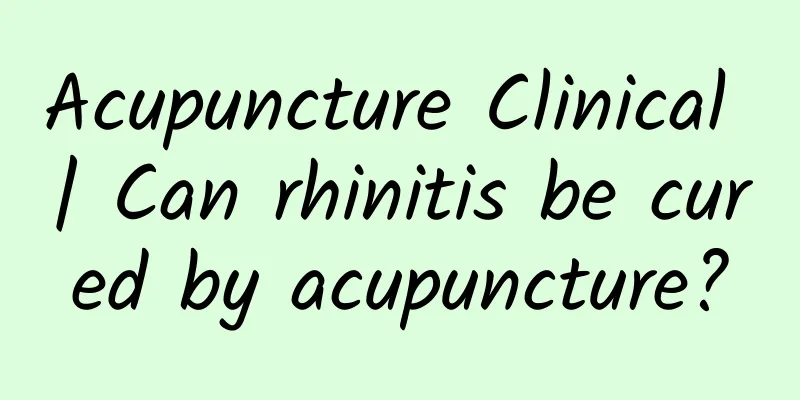Acupuncture Clinical | Can rhinitis be cured by acupuncture?

|
01. Introduction The beginning of autumn has passed, and the dry autumn is coming. Although autumn is said to be cool and refreshing, many people with rhinitis are suffering. Symptoms such as nasal congestion and sneezing often bother them in autumn, seriously affecting their lives and work. In recent days, many friends have asked how to prevent and treat rhinitis. Have you tried acupuncture to treat rhinitis? The following editor will introduce how acupuncture can treat rhinitis. 02. What is rhinitis? Rhinitis refers to inflammatory lesions of the nasal mucosa, which can be divided into acute, chronic and allergic types. Acute rhinitis is an acute infectious inflammation of the nasal mucosa. Chronic rhinitis includes simple rhinitis, hypertrophic rhinitis and atrophic rhinitis. It is a chronic inflammatory disease of the nasal mucosa and submucosal membranes. It can be caused by chronic acute rhinitis or long-term stimulation from dust or chemicals. Allergic rhinitis, also known as "allergic rhinitis", is an allergic disease of the nasal mucosa caused by a variety of specific allergens. Acute rhinitis belongs to the category of "cold" and "flu" in traditional Chinese medicine. It is often caused by external wind-cold attack, stagnation of lung qi or upward invasion of wind-heat, failure of the lung to clear and purify, and accumulation of evil toxins in the nasal cavity. Chronic rhinitis belongs to the category of "nasal congestion" and "nasal dryness" in traditional Chinese medicine. It is mostly caused by deficiency of lung and spleen qi, stagnation of evil in the nasal orifices or long-term retention of evil toxins, stagnation of qi and blood stasis, and blockage of the nasal orifices. Allergic rhinitis belongs to the category of "allergic rhinitis" in traditional Chinese medicine. It is mostly caused by weak lung qi or spleen deficiency or kidney deficiency that damages the lung qi, allowing wind and cold to enter the nose, causing stagnation of body fluid and leading to nasal blockage. 03. Clinical manifestations of rhinitis Acute rhinitis has nasal congestion, runny nose, sneezing, and loss of smell as its main symptoms. The patient often feels unwell all over the body. Children have more severe symptoms, which may be accompanied by gastrointestinal symptoms, or even high fever and convulsions. Chronic simple rhinitis is characterized by intermittent or alternating nasal congestion, which is lighter during the day and heavier at night, with frequent mucus, often mucous, and occasionally accompanied by a small amount of mucopurulent mucus. Chronic hypertrophic rhinitis causes persistent nasal congestion, with little mucus, which is sticky and purulent and difficult to discharge. It is accompanied by headache, lack of energy, symptoms of involvement of adjacent organs (middle ear, sinuses, pharynx, larynx), and a significant decrease in the sense of smell. In addition to nasal congestion, atrophic rhinitis is often accompanied by dry nasopharynx, nosebleeds, decreased sense of smell, and nasal odor. Allergic rhinitis presents with paroxysmal nasal itching, clear runny nose, sneezing, and may be accompanied by a history of other allergic diseases. 04. Acupuncture treatment ①Treatment principles For external attack of wind evil, dispel wind and clear the exterior, clear the nasal passages; for wind-heat syndrome, only acupuncture is used without moxibustion; for wind-cold syndrome, acupuncture and moxibustion are used together, and the purgation method is used in both cases; For patients with qi stagnation and blood stasis, acupuncture is mainly used to promote qi and blood circulation, dissipate blood stasis and open the meridians, and purgative methods are used; For those with qi deficiency and evil stagnation, tonify the lungs, strengthen the spleen, and benefit the kidneys to eliminate the evil, and use acupuncture and moxibustion together, with tonifying methods or balanced tonifying and purging. ②Prescription The main treatments are on the nasal cavity and acupoints of the Hand Yangming Meridian. Yingxiang, Bitong, Yintang, and Hegu. ③Acupuncture Yingxiang is the terminal point of the hand yangming meridian, located beside the nose, clearing the nasal passages and curing all nasal diseases. Bitong is located at the root of the nose, and Yintang is located on the nose. Both points are important for treating rhinitis. Hegu is the original point of the Hand Yangming Meridian and is good at treating various diseases of the head and face. All the acupoints can be used together to dispel wind, clear the lungs and open up the nasal passages. 05. How to prevent rhinitis ① Acupuncture has a good effect on the treatment of this disease. Generally, 2 to 3 acupuncture treatments can achieve significant results for acute rhinitis, especially for improving the ventilation function of the nasal passages. The course of treatment for chronic rhinitis is relatively long. ② During the acute phase, you should get adequate rest, eat easily digestible and nutritious foods, eat more fresh vegetables and fruits and foods high in protein, avoid eating raw and cold foods, eat less spicy, fried, barbecued and other irritating foods, drink more hot water, and keep your bowel movements smooth. ③ People with allergic rhinitis should actively look for allergens, avoid contact, wear masks when going out, and minimize contact with pets. ④ Exercise regularly and do appropriate outdoor sports, such as jogging and brisk walking, to enhance resistance and strengthen respiratory defense capabilities. ⑤ Maintain a good attitude, pay attention to the combination of work and rest, change bad living habits, avoid excessive fatigue, pay attention to weather changes, add or remove clothes in time, and actively prevent and treat upper respiratory tract diseases such as colds. About the Author: ○ Engage in research on acupuncture theory and clinical practice, research on acupoint optimization and compatibility rules, and research on external treatment of meridian points. ○ He presided over and participated in 18 national and provincial scientific research projects, published 21 core journal papers as the first (corresponding) author, was the deputy editor-in-chief and co-editor of 7 academic works, and won 1 second prize in science and technology from the Chinese Acupuncture Association. ○ Specializes in allergic diseases (rhinitis, eczema, urticaria, etc.), myopia in children and adolescents, spleen and stomach diseases (chronic gastritis, abdominal distension, diarrhea, indigestion, gastroptosis, gastric ulcer), insomnia, headache, facial paralysis, tinnitus and deafness, periarthritis of the shoulder, pain in the neck, shoulder, waist and legs, trigeminal neuralgia, sciatica, dysmenorrhea, herpes zoster and other painful diseases, chronic prostatitis, constipation, hypertension, sequelae of stroke, sub-health conditioning and other traditional Chinese medicine treatments. Clinic hours: Tuesday, Friday, Saturday, Sunday morning Clinic location: The First Affiliated Hospital of Henan University of Traditional Chinese Medicine, Traditional Therapy Department, Outpatient Building, 8th Floor |
<<: Professor Tian Yantao: How much do you know about the mysterious "stomach acid"
>>: Beware! 58% of global human infectious diseases are becoming more severe due to climate change…
Recommend
How long does bleeding last during early pregnancy?
There will be a small amount of bleeding in the e...
There is a trace of blood in the vaginal discharge today
The reason why there is a trace of blood in the l...
What are the main items of Down syndrome screening for pregnant women?
The term Down syndrome screening is not unfamilia...
What are the dangers of hypothyroidism in women
Hypothyroidism may be relatively unfamiliar to ma...
What to do if you have insomnia? How to fall asleep quickly? Will insomnia cause obesity?
I never had insomnia before, but I don’t know wha...
Can adenomyosis heal on its own?
Adenomyosis is a common disease among women. The ...
Why do some doctors not recommend running?
People often tell me that when they go to the hos...
There is blood after intercourse
We all know that it is best not to have sex durin...
What to do if you want a second child but can’t get pregnant
Nowadays, our country has opened up the two-child...
The efficacy and function of Gynecological Qianjin Tablet Capsules
Gynecological Qianjin Capsules are over-the-count...
Why is there no bleeding the next day after medical abortion?
Medical abortion, you can tell what it means base...
Is the small belly to protect the uterus and ovaries? Doctors warn: Storing too much abdominal fat is very harmful!
"Women's small belly is to protect the u...
How long after cesarean delivery can I have sex?
How long after a cesarean section can you have se...
What are the precautions after the ring is placed?
In modern society, there are actually quite a few...
How long does it take for a woman to reach menopause?
Women will go through menopause when they reach a...









